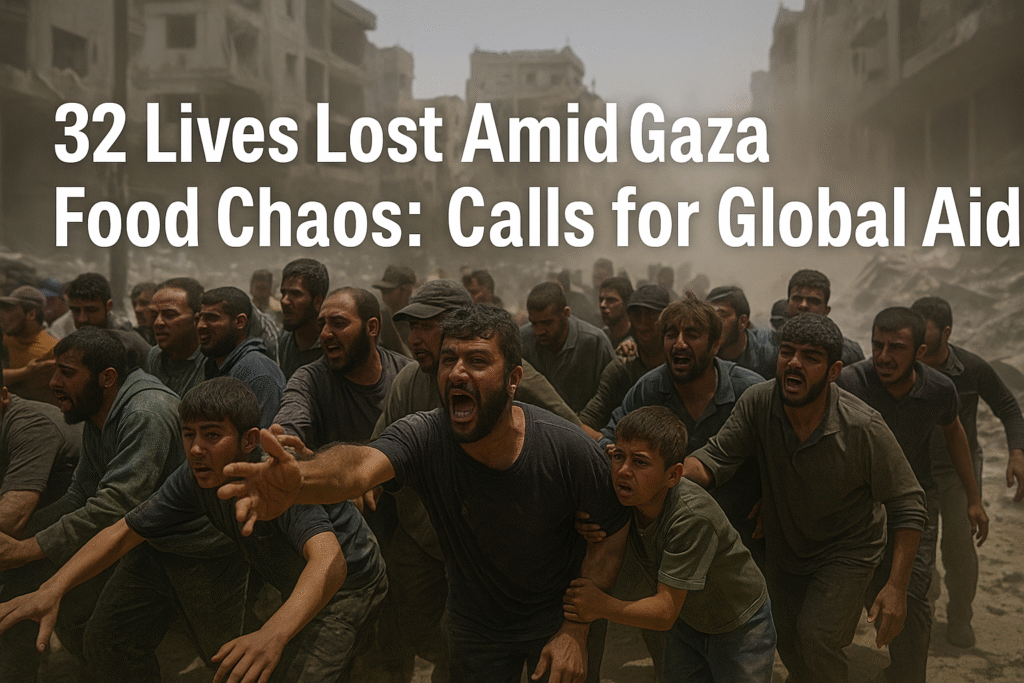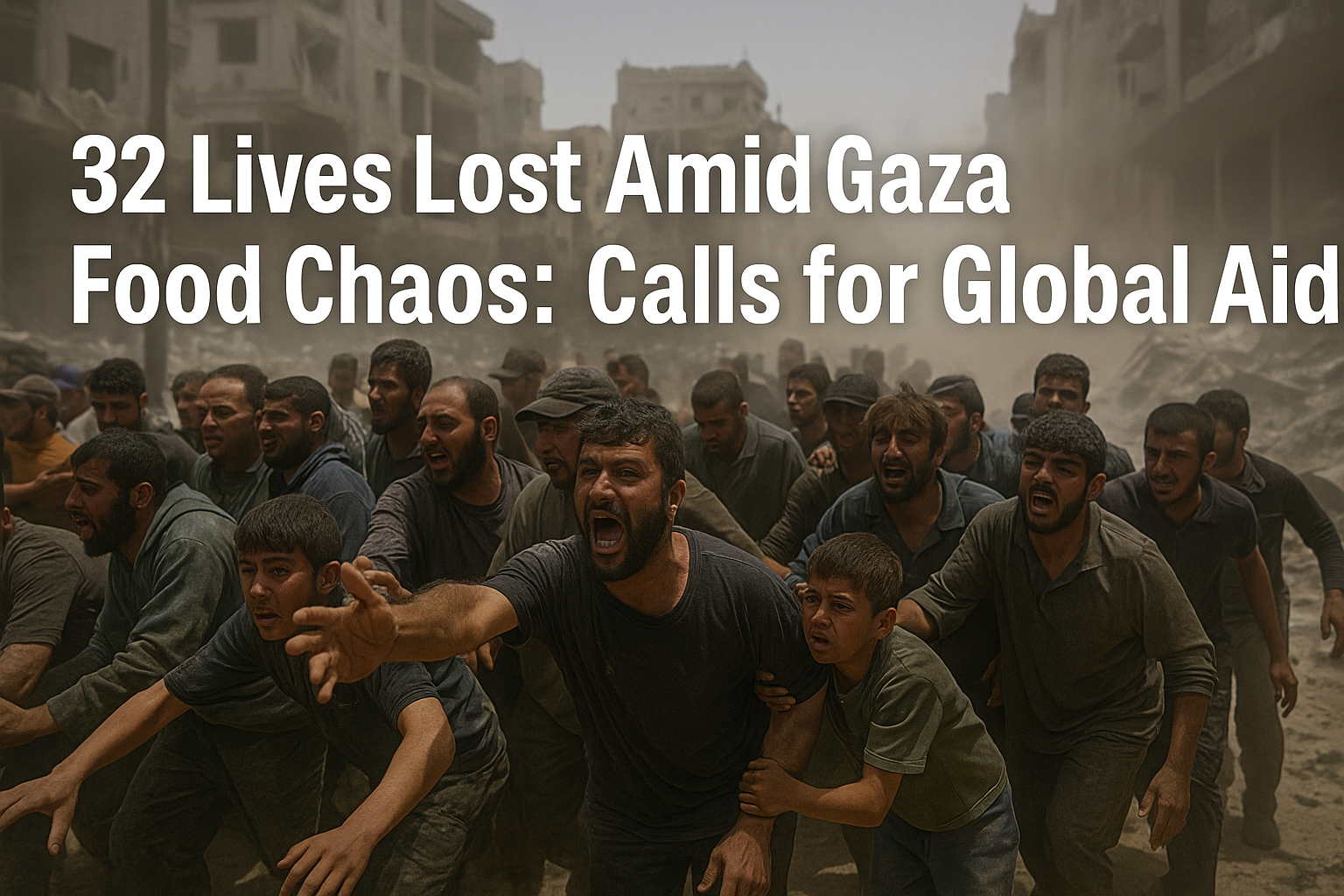The humanitarian catastrophe in Gaza reached a new level of urgency as 32 Palestinians were shot dead while attempting to access food from distribution centers run by the Gaza Humanitarian Foundation (GHF), a U.S.- and Israeli-backed organization. This harrowing incident has sparked international outrage and renewed calls for global aid as the region reels under months of conflict, displacement, and starvation.
Chaos at Food Distribution Hubs
Witnesses and health officials reported that Israeli forces opened fire near aid distribution hubs in southern Gaza, specifically close to the cities of Khan Younis and Rafah. These hubs, managed by the GHF, were established to bypass the traditional UN-led aid systems, which Israel claims have been infiltrated by Hamas. However, the United Nations has categorically denied these allegations.
Despite GHF’s assertion that they have distributed millions of meals, the reality on the ground paints a different picture. Crowds desperate for sustenance are routinely met with violence, with this latest tragedy pushing the death toll in such incidents into the hundreds. The deaths have only intensified calls for global aid, with many urging the international community to intervene and ensure the safe and equitable delivery of humanitarian supplies.
Witness Accounts of Horror
Mahmoud Mokeimar, a survivor, described the scene as chaotic and terrifying. “The occupation opened fire at us indiscriminately,” he said, recalling the moment troops began shooting as people approached the aid hub. Akram Aker, another eyewitness, said machine guns and drones were used. “They encircled us and started firing directly at us.”
Sanaa al-Jaberi, clutching an empty bag, questioned the cruelty of the situation. “Is this food or death? Why? They don’t talk with us, they only shoot us.” Her haunting words resonate with growing international concern and add urgency to calls for global aid from human rights groups and aid organizations.
Mounting Casualties
According to officials at Nasser Hospital in Khan Younis, 25 bodies were brought in following the incident, with another seven reported dead in Rafah. Dr. Mohamed Saker, head of the hospital’s nursing department, noted that most victims had gunshot wounds to the head and chest. The hospital, overwhelmed and undersupplied, treated many injured on the floor due to a lack of medical equipment.
Further airstrikes across central and northern Gaza claimed additional lives. Al-Awda Hospital confirmed 12 fatalities in one strike, including police official Omar Aqel and five female family members. In Gaza City, at least four more died in a separate incident. These growing numbers have deepened the humanitarian crisis and fueled persistent calls for global aid.
Humanitarian Crisis Worsens
With over 2 million Palestinians living in dire conditions, the humanitarian crisis in Gaza is now catastrophic. Most families are struggling with hunger, lack of shelter, and limited access to medical care. GHF distribution sites, though intended to provide relief, have become flashpoints of violence and danger. Videos and eyewitness accounts show chaotic scenes, with desperate crowds lunging for food and security forces responding with force.
The international community is witnessing a preventable tragedy unfold in real time. The scale of suffering and systemic breakdown in humanitarian access have become central reasons for growing calls for global aid, especially from non-governmental organizations and advocacy groups urging coordinated action.
Ceasefire Talks and Limited Progress
While Israel and Hamas continue ceasefire negotiations in Qatar, little progress has been made. Mediators have expressed frustration at the deadlock, emphasizing the need for both sides to prioritize civilian lives. Families of Israeli hostages have also joined calls for global aid, pushing their government to end the conflict and secure the release of the remaining 50 hostages.
Efrat Machikawa, a relative of a released hostage, voiced this sentiment at a rally in Tel Aviv, saying, “After 652 days, it is time to do what is right for Israel: Bring all 50 hostages home and end this war.”
Following this, thousands marched to the U.S. Embassy’s local branch demanding a ceasefire, further echoing the now-unified calls for global aid to stop the suffering and secure humanitarian corridors.
Religious Sites Under Threat
The violence is not limited to Gaza. In the occupied West Bank, residents of the Christian village Taybeh reported that extremist settlers set fire to the Church of St. George. During his visit, U.S. Ambassador Mike Huckabee condemned the attack, calling it “an act of terror” and urging Israel to curb settler violence.
Such incidents underscore the broader regional instability, reinforcing the necessity of strong, coordinated calls for global aid to protect civilians and religious sanctities alike.
Rising Civilian Toll
Since the start of the conflict in October 2023—sparked by a Hamas-led incursion into Israel that killed 1,200 people and resulted in the capture of 251 hostages—more than 58,000 Palestinians have died, according to Gaza’s Health Ministry. The toll includes a significant number of women and children, despite Israeli claims of targeting militants.
The U.N. and other international agencies continue to rely on Gaza’s Health Ministry as the most accurate source of data, amplifying their calls for global aid to ensure medical, nutritional, and psychological support for survivors.
Failure of Current Aid Mechanisms
Despite support from the U.S. and Israel, GHF’s operations have come under scrutiny. The group’s inability to guarantee the safety of aid seekers and the military control around distribution zones have been cited as critical failures. GHF maintains it repeatedly warned civilians not to travel at night, but this directive is impractical for people facing starvation.
The situation has prompted widespread calls for global aid to be channeled through more neutral, internationally trusted organizations such as the United Nations or the Red Cross, which may be better equipped to ensure the safe, non-politicized delivery of assistance.
Global Reactions and Demands for Accountability
International condemnation of the recent killings has been swift. Human rights organizations like Amnesty International and Human Rights Watch have demanded independent investigations into the attacks. Prominent world leaders and diplomats have also issued statements urging a halt to the violence and demanding that aid corridors be opened immediately.
These declarations have turned into loud calls for global aid not just as a response to the killings, but as a long-term commitment to rebuilding Gaza and protecting civilians from further atrocities.
Conclusion: The Time for Action Is Now
The deaths of 32 Palestinians trying to collect food are more than a tragic footnote in this prolonged conflict—they are a grim symbol of a failed humanitarian strategy. As starvation grows, hospitals collapse, and civilians are caught in the crossfire, the need for a unified international response has never been greater.
Calls for global aid are no longer optional—they are a moral imperative. The world must act swiftly to ensure that food, medicine, and hope reach those who need it most. The people of Gaza cannot afford to wait any longer.


One thought on “32 Lives Lost Amid Gaza Food Chaos: Calls for Global Aid”
Comments are closed.